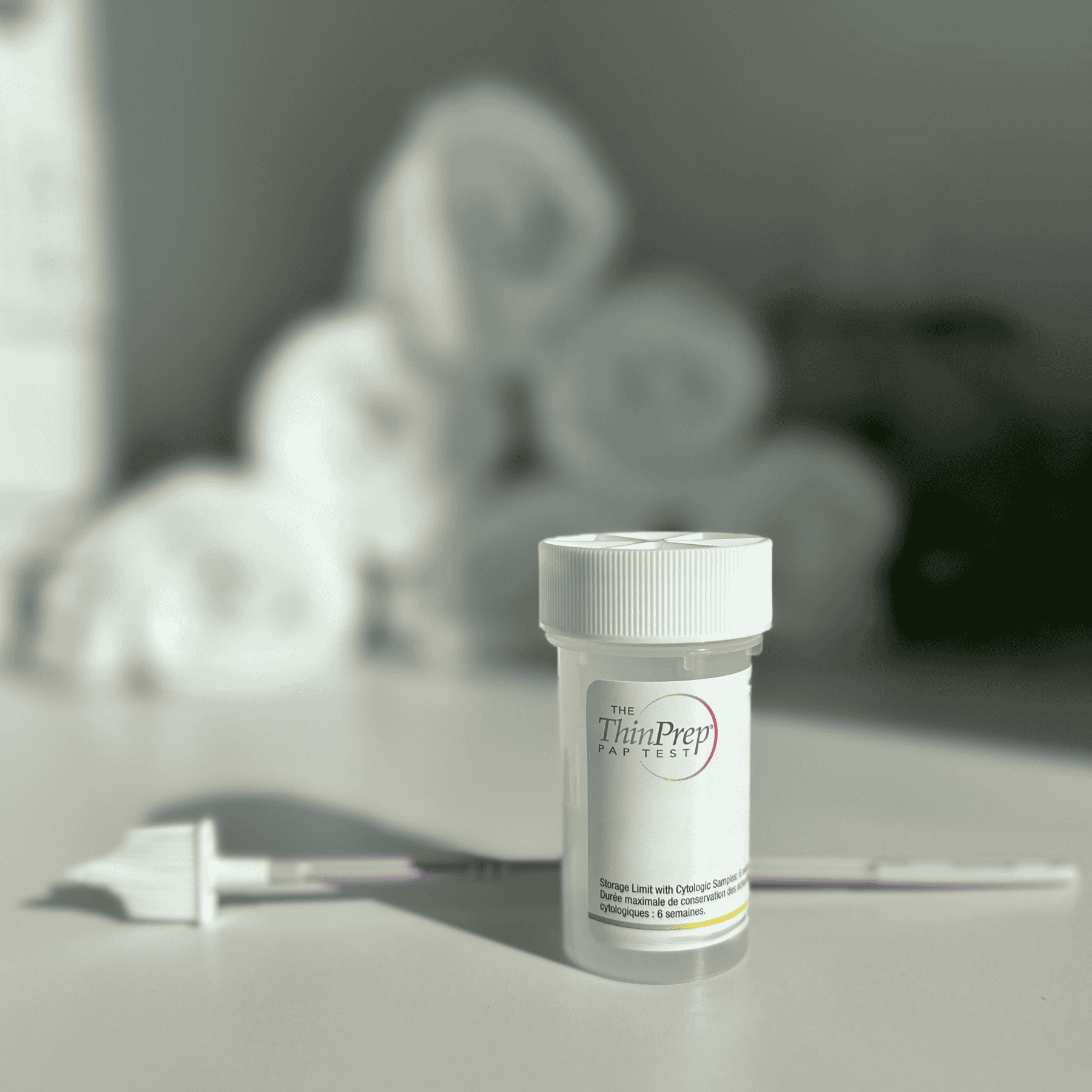Pap test/HPV
*No prescription required
A quick and simple procedure
Provides you with peace of mind
Recommended for sexually active women
Early detection saves lives
THE DIFFERENCE BETWEEN THE TWO TESTS

The Pap test allows for the detection of abnormal cells on the cervix. These abnormalities can be caused by several factors, including an HPV infection, as well as other changes in the cells. It is important to note that not all abnormal cells detected by a Pap test are necessarily dangerous.
Some abnormalities may be caused by benign infections, irritations, or hormonal changes that will never lead to cancer and may resolve on their own. However, some abnormal cells can become precancerous if they are not monitored or treated. The Pap test helps identify these abnormalities before they develop into something more serious.
Why get a Pap test?
To detect abnormal cells early that could, in some cases, develop into cervical cancer. This allows for monitoring or treating abnormalities if necessary.

The HPV test, on the other hand, specifically looks for the presence of the human papillomavirus on the cervix. Some types of HPV are high-risk and are known to cause cellular changes that can lead to cancer. This test helps determine if you are carrying any high-risk types of HPV.
Why get an HPV test?
To find out if you have been infected with a high-risk type of HPV that could cause changes in the cells of your cervix, thus increasing your risk of developing cancer.
UNDERSTANDING THE DIFFERENCE BETWEEN THE TWO TESTS
The Pap test, or Papanicolaou test, allows for the detection of abnormal cells on the cervix. These abnormalities can be caused by several factors, including an HPV infection, as well as other changes in the cells. It is important to note that not all abnormal cells detected by a Pap test are necessarily dangerous. Some abnormalities may be caused by benign infections, irritations, or hormonal changes that will never lead to cancer and may resolve on their own. However, some abnormal cells can become precancerous if they are not monitored or treated. The Pap test helps identify these abnormalities before they develop into something more serious.
Why get a Pap test?
To detect abnormal cells early that could, in some cases, develop into cervical cancer. This allows for monitoring or treating abnormalities if necessary.
The HPV test, on the other hand, specifically looks for the presence of the human papillomavirus on the cervix. Some types of HPV are high-risk and are known to cause cellular changes that can lead to cancer. This test helps determine if you are carrying any high-risk types of HPV.
Why get an HPV test?
To find out if you have been infected with a high-risk type of HPV that could cause changes in the cells of your cervix, thus increasing your risk of developing cancer.
Take care of your sexual health
Cervical cancer is almost entirely linked to HPV. Every year, approximately 1,350 women in Canada are diagnosed with this cancer, and 410 die from it. Globally, HPV strains 16, 18, 31, and 45 are most frequently associated with the development of this type of cancer.
These statistics are alarming and highlight the importance of taking care of your sexual health.
1350 cases
new cases diagnosed each year in Canada
410 people
die from cervical cancer in Canada
Take care of your sexual health
Cervical cancer is almost entirely linked to HPV. Each year, approximately 1,350 women in Canada are diagnosed with this cancer, and 410 die from it. Globally, HPV strains 16, 18, 31, and 45 are most frequently associated with the development of this type of cancer.
These figures are alarming and highlight the importance of taking care of your sexual health.
1350 cases
new cases diagnosed each year in Canada
410 people
die from cervical cancer in Canada
Appointment
PAP TEST package
209$ non taxable
- Quick results with a minimum delay of 5 days
- Consultation focused on the comfort and well-being of the patient
- Insurance receipt provided
HPV package
239$ non taxable
- Quick results with a minimum delay of 7 days
- Consultation focused on the comfort and well-being of the patient.
- Insurance receipt provided
HPV reflex package
289$ non taxable
- HPV analysis with quick results, minimum delay of 7 days. If the HPV result is positive, Pap test analysis with quick results, minimum delay of 5 days.
- Consultation focused on the comfort and well-being of the patient.
- Insurance receipt provided
PAP TEST package
209$ non taxable
- Quick results with a minimum delay of 5 days
- Consultation focused on the comfort and well-being of the patient
- Insurance receipt provided
HPV package
239$ non taxable
- Quick results with a minimum delay of 7 days
- Consultation focused on the comfort and well-being of the patient.
- Insurance receipt provided
HPV reflex package
289$ non taxable
- HPV analysis with quick results, minimum delay of 7 days. If the HPV result is positive, Pap test analysis with quick results, minimum delay of 5 days.
- Consultation focused on the comfort and well-being of the patient.
- Insurance receipt provided
Why choose NIOS Clinic?
At NIOS Clinic, we are committed to providing high-quality care with a gentle approach to our patients, including during gynecological exams. All tests are conducted by qualified and experienced professionals to ensure accurate results and patient comfort throughout the procedure.
Appointment
Why choose NIOS Clinic?
At NIOS Clinic, we are committed to providing high-quality care with a gentle approach to our patients, including during gynecological exams. All tests are conducted by qualified and experienced professionals to ensure accurate results and patient comfort throughout the procedure.
Appointment
FAQ
The Pap test and HPV test detect abnormalities in the cells of the cervix and the presence of high-risk viruses responsible for cervical cancer, allowing intervention before cancer develops.
These tests do not directly prevent cancer, but they can detect abnormal cells or an infection at an early stage. This allows for quick intervention to address abnormalities before they develop into cancer. Early intervention can thus prevent serious complications by treating issues before they become more severe.
The test may be uncomfortable, but it should not be painful. It involves taking a sample of cells from the cervix using a small instrument. The process is very quick and usually takes only a few minutes, which helps minimize discomfort.
Yes, an infection, menstruation, or the use of vaginal products can interfere with the test results.
It depends on the severity. Abnormal results may require regular monitoring or treatment to remove the abnormal cells.
Book an appointment online
Book your consultation now for personalized care and expert service. Contact us by phone or book online to take care of yourself today.
Contact us





